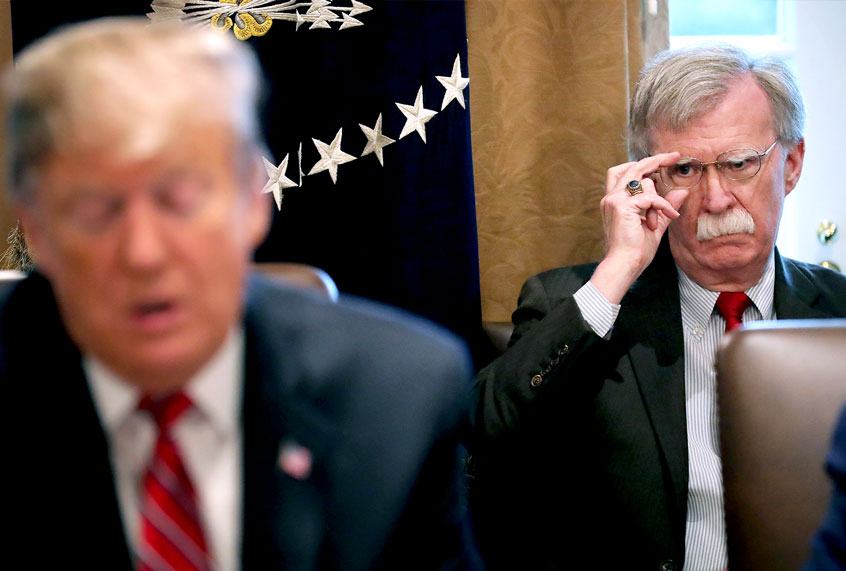World
John Bolton Faces 18 Counts of Mishandling Classified Information

Former United Nations Ambassador and National Security Adviser John Bolton has been indicted on 18 counts of mishandling classified information, a significant escalation in legal action against high-profile government officials. This indictment marks more than three times the number of counts typically seen in recent Espionage Act prosecutions, raising concerns about the implications of selective prosecution and political motivations.
The charges against Bolton stem from allegations that he improperly shared classified information, including diary-like entries, with family members who lacked the necessary security clearances. His case has sparked debate about the handling of classified information among public officials, particularly in light of recent controversies involving other prominent figures.
In August, Bolton’s home was searched as part of an investigation into whether he illegally possessed or shared classified information in connection with his memoir. This raid has been criticized as a harsh measure by the Trump administration, suggesting a chilling effect on whistleblowers and critics of the government. The charges brought under the Espionage Act have raised alarms for their potential use as a tool against perceived adversaries.
Bolton’s situation is complicated by Donald Trump‘s past comments regarding him. Trump has branded Bolton as “treasonous” and has publicly called for his imprisonment, which may bolster Bolton’s defense against claims of selective prosecution. The former president’s remarks could play a pivotal role in the legal proceedings, possibly leading to a dismissal of charges based on claims of vindictiveness.
In light of his legal challenges, Bolton might argue that he faces a two-tiered justice system, where the ramifications for disclosing classified information differ significantly depending on one’s political standing. Historical cases illustrate this disparity; for instance, David Petraeus, a retired Army General, received only probation and a fine for mishandling classified materials, while others have faced harsher penalties.
As Bolton navigates this complex legal landscape, his defense may hinge on a motion to dismiss based on the selective nature of the prosecution. Such motions are often challenging to win, yet Bolton’s circumstances might present a rare opportunity for success given the public statements made by Trump.
The broader implications of Bolton’s indictment extend beyond his personal legal troubles. They reflect ongoing tensions surrounding the treatment of classified information and the accountability of public officials. As the case unfolds, it will be critical to observe how it affects perceptions of fairness within the legal system, particularly regarding those who have wielded power in the highest offices of government.
In a political climate marked by division and retribution, the case of John Bolton stands as a significant moment that could reshape discussions about justice and accountability for those in positions of authority.
-

 Science2 months ago
Science2 months agoInventor Achieves Breakthrough with 2 Billion FPS Laser Video
-

 Health2 months ago
Health2 months agoCommunity Unites for 7th Annual Into the Light Walk for Mental Health
-

 Top Stories2 months ago
Top Stories2 months agoCharlie Sheen’s New Romance: ‘Glowing’ with Younger Partner
-

 Entertainment2 months ago
Entertainment2 months agoDua Lipa Aces GCSE Spanish, Sparks Super Bowl Buzz with Fans
-

 Health2 months ago
Health2 months agoCurium Group, PeptiDream, and PDRadiopharma Launch Key Cancer Trial
-

 Top Stories2 months ago
Top Stories2 months agoFormer Mozilla CMO Launches AI-Driven Cannabis Cocktail Brand Fast
-

 Entertainment2 months ago
Entertainment2 months agoMother Fights to Reunite with Children After Kidnapping in New Drama
-

 World2 months ago
World2 months agoIsrael Reopens Rafah Crossing After Hostage Remains Returned
-

 Business2 months ago
Business2 months agoTyler Technologies Set to Reveal Q3 Earnings on October 22
-

 World2 months ago
World2 months agoR&B Icon D’Angelo Dies at 51, Leaving Lasting Legacy
-

 Health2 months ago
Health2 months agoNorth Carolina’s Biotech Boom: Billions in New Investments
-

 Entertainment2 months ago
Entertainment2 months agoRed Sox’s Bregman to Become Free Agent; Tigers Commit to Skubal









